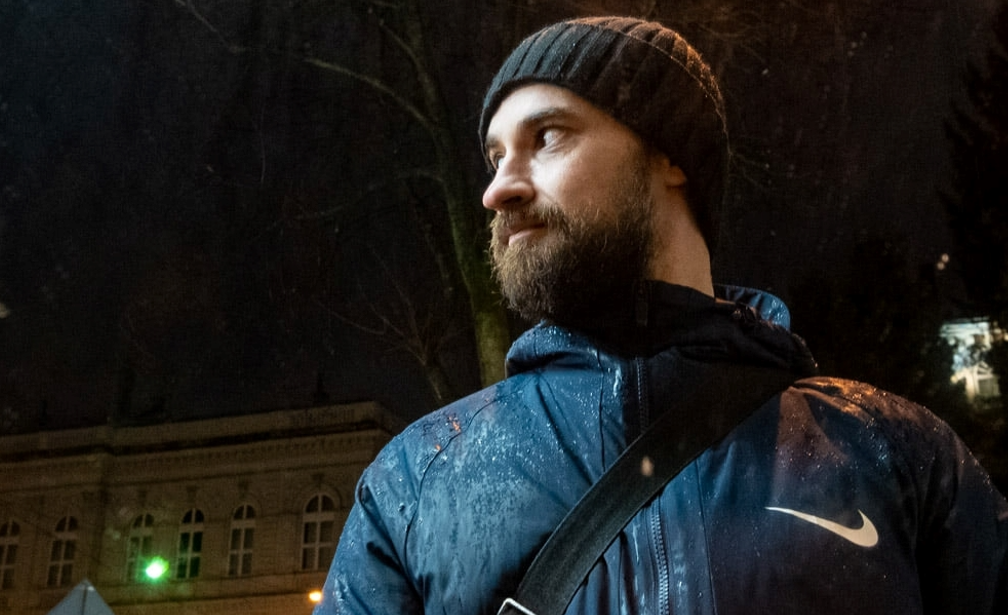
[For urgent updates please follow Ukrainian Freedom News in Telegram]
This man comes from the city where the enemy is committing genocide. Researcher of monumental art, co-author of «All Shades of Mariupol Mosaics», journalist and photographer Ivan Stanislavskyi told Lviv Now how he spent 20 days in the siege, 12 of which were in the basement, and how Russia wants to wipe Mariupol off the face of the earth.

President Volodymyr Zelenskyi has granted the status of a «hero city» to Mariupol because of its strong resistance to the occupiers during the Russian-Ukrainian war. Photos of the Mariupol bombings do not leave the columns of magazines and news feeds. The encouragement from the legendary resistance of the Ukrainian military borders on the shock experienced by ordinary citizens. Ivan Stanislavskyi narrates his story of living under the enemy’s shelling of civilian objects, hospitals, and maternity hospitals.
Tell us, how did you live in Mariupol all this time and how did you get out of it?
We left Mariupol on March 15. In our city now, there is no mobile connection, no network, no information. Phones are discharged, there is no electricity. We lived for several weeks expecting some kind of evacuation – no matter official or unofficial. But there was none. On March 15, we got in the car and left.
The journey was very difficult, scary, even for me – a man with strong nerves, as I considered myself. The road to Zaporizhzhia took three hours during peacetime – we drove 26. We had to spend the night between the positions of the Ukrainian and Russian military, in the middle of the field. It was the most difficult, most horrible moment of the first stage of our journey.
The next day, we arrived in Zaporizhzhia, in the territory controlled by Ukraine. We had no information about where the Russian and Ukrainian positions were. While driving, we didn’t understand whose checkpoints we were passing.
When the last information was available, in early March, we knew that fighting was taking place near Melitopol, and somehow naively thought that Ukrainian troops were there. But on the way, they realized that Russian troops were already near Zaporizhzhia, 27 or 30 kilometres from Zaporizhzhia, between Vasylivka and Kamyanka. And on this race, Vasylivka – Kamyanka, we stayed overnight in the middle of the field, in the combat zone. It was scary.
Did you go down the humanitarian corridor?
We didn’t know about any corridor. There was no connection. We sat down and went with other people. We got in a big queue, there was a column. We found out about a humanitarian corridor in the afternoon, when we were already near Berdyansk. And when there was some kind of connection, a text message came from the State Emergency Service, informing that there was a corridor.
That is, as I understand it, you set out at your own risk?
Exactly.
And what is the current situation in Mariupol?
What is happening in the city, I can judge only by what the media reports, and through messages that «break through» from friends. Mariupol was almost wiped off the face of the earth. Everything that’s possible is damaged, beaten, and this process continues: active combat is going on in almost all areas.
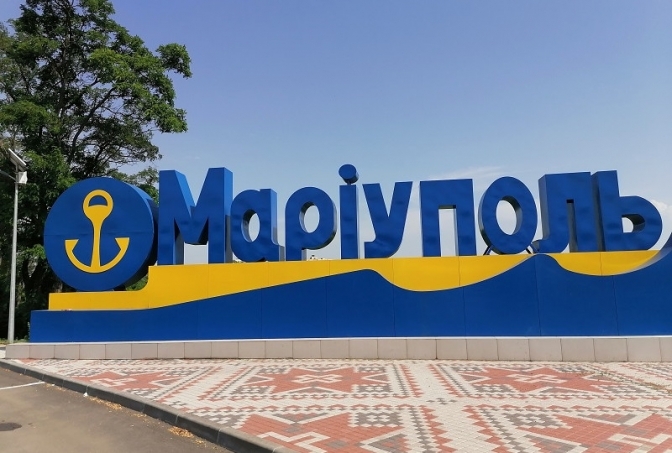
How did you meet the first news about the beginning of the war?
This is quite a strange story, because no one in Mariupol, including me, believed that a war would break out. Before that, I had been assisting foreign journalists as a fixer for several weeks. Their task was to show how Mariupol was preparing for war. And when we visited the city authorities, they were surprised that in fact, Mariupol was not preparing. It was weird to them, their perception of the situation was very different from ours.
Of course, I followed all the information, not only from our media, but also from abroad. I had contacts with foreign journalists who were in Kyiv at the time. But on February 24, I was shocked by this news. It happened, and happened on such a large scale, so boldly.
Although I seem to have critical thinking, I did not think that it would be offensive in several directions. I thought it would be like in 2014: some hybrid options, attacks, shelling.
Where are your friends now, parents? Do you keep in touch with them?
I keep in touch with friends who have left. There is still no connection with those who remained in the city. Who went where. At first, there was one route – Berdyansk, Zaporizhzhia, Dnipro, Vinnytsia and Lviv. Almost all went on different routes and settled in different cities. Many came to Lviv.
How did you experience the war in Mariupol? What was your life like, your daily activity?
We lived in a five-story house, a «khrushchovka» [the type of a flat in the mass built houses from the period of Khrushchev’s rule in the Soviet Union], in a densely populated Prymorskyi district. There was a market, a lot of supermarkets there. It’s a beautiful area of Mariupol. But in the first days of the war, I realized that our area was not prepared in the case of shelters. In my house, there was no basement at all, only a pantry with valves, some sewerage, heating. There was nowhere to hide.
Fortunately, the next house, which was also a five-story building, had a storeroom in the basement, a warehouse of an old Soviet store that was not used. That’s where we stayed for two weeks with 20 days of the siege of Mariupol. One night, we hid in the sports centre, spent a few more nights with our friends in the private sector, but it quickly got «hot» there. Hence, we went back to our neighbourhood, to the basement under the store.
We were there for two weeks without electricity, gas or water. We went outside to cook on the fire, to boil water – raining one or from spring. Someone went to the river, melted the snow. This way we lived until we left. All my attention and efforts were focused on getting water, food and cooking during the short breaks between shellings.
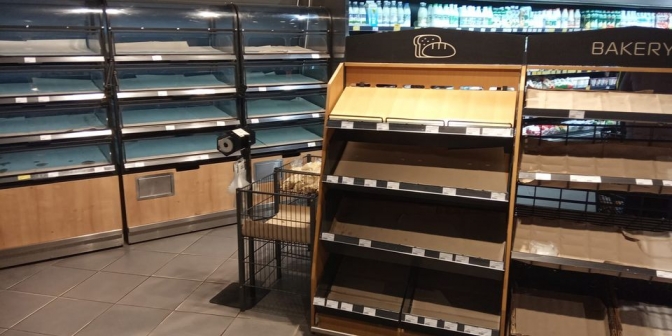
My wife’s relatives moved in with us: a sister with her husband and a three-year-old child. So I had to cook for five people. It was not easy, it took all the time. I went out, got water or didn’t get, boiled it, we drank tea, then I cooked something – and it was already evening. Then I went to the shelter again and stayed there until morning.
Have you communicated with our military? How are they doing, is there a fighting spirit?
I hardly communicated with the military. Perhaps, they had such an order – not to communicate with the civilian population, with strangers. When I saw our military and tried to ask them something like: how they felt, where the enemy was, did they need anything, what to expect – I heard only short answers like «all is well», «we are busy».
Where did you stop now and how did Lviv meet you in general?
For the first few days, we stayed with the relatives of my wife’s sister, with whom we left Mariupol. Her husband is a citizen of Ecuador, and now they are emigrating from Ukraine. We stay here. They rented us a room for one night, where we spent the night today.
Tomorrow, we will go to a village, I do not remember the name. We will try to settle there, because there is no free housing in Lviv. We can’t rent housing now, the rent is very expensive – from 10 thousand hryvnias (320$) per month, and this is for the worst option.
Did your parents stay in Mariupol?
Mine – yes, I don’t know how they are doing right now. I have information from third parties that the area where they lived was not affected as much as ours. Our neighbourhoods were mined every day, even bombs dropped. It was really scary. And their area was probably not strategically interesting to the enemy. I hope all is well with my parents.
Was it difficult to get food on the way? Did you come across any shops, was barter possible?
All our shops were looted in the first days of March. There are only two supermarkets left. I have already said that we had a very lively area. Only in my house, there were three pharmacies, two more shops at the crossroads and three large supermarkets – «ATB» and two other local chains.
Of all this, only one supermarket remained, which worked for some time. Maybe a week, maybe a week and a half. I don’t know how, but its owner managed to negotiate with the defence, and its members guarded the supermarket. People lined up near the store in a huge queue, standing for six or eight hours to buy something. The range was, so to speak, poor: there was what no one bought. But bread and water could not be found.
We have existed for some time thanks to our food stocks. I managed to go to the store and buy something only twice. Then, a shell also hit the only supermarket, and it was looted.
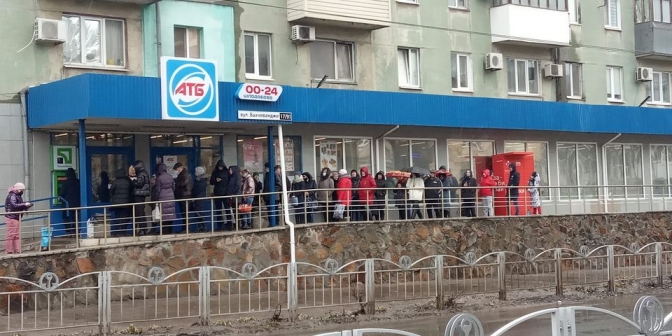
Was it the same with pharmacies?
Yes. They were also looted, barbarically. I remember an interesting story. Downstairs lived a family with whom we cooked over a campfire. Their son had a rare autoimmune disease, which, however, was well treated with pills. If he stopped taking the prescribed drugs, which were not sold in all pharmacies, he could die. Literally, five or ten people in the city suffered from this disease. His mother went to the pharmacy and saw that it had been robbed. She found the necessary but crushed pills, collected them from the floor in the palm of her hand to bring to her son. And such senseless looting was everywhere.
Even from the ATB supermarket, people took out not only food, but also freezers. They carried it to the fifth floors of houses. I saw it myself. They also took out the terminals. I do not understand where they can be used at home.
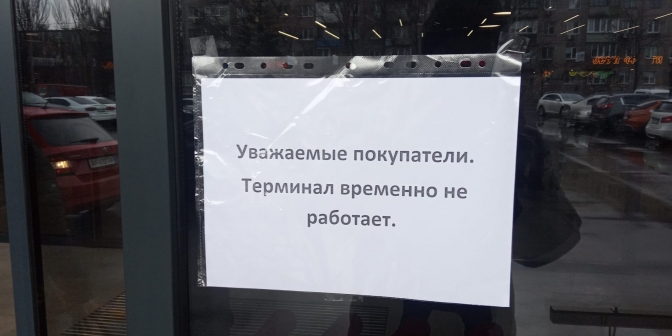
You can tell about the shelling. The enemy says it does not strike at civilian targets. How far from you was, for example, that dramatic theatre, which is now completely destroyed?
This theatre was destroyed on March 16. We left on March 15. He was quite far from me – 15-20 minutes on foot.
Until we left, we didn’t realize what had happened to our city. We were limited by our area because it became very dangerous to walk far away. Of course, someone travelled when needed, looking for medicine, someone wanted to find relatives…
We saw what was collapsing around us, but we did not know what was happening in remote areas. And only when we went to Dnipro, where we had the opportunity to charge phones and where there was already a stable connection, we realised what a mess our city became, how much it was bombed.
Це Маріуполь сьогодні. Наче мертве, розстріляне ворогом місто. Але воно ще живе. Там дихають люди - голодні, в підвалах догораючих будинків. Їх серця ще б'ються під завалами з надією на порятунок. Маріуполь відчуває біль. Проте він все ще живий організм, який чекає на порятунок. pic.twitter.com/3aSjBitmXq
— АЗОВ (@Polk_Azov) March 23, 2022
[Translation of the Telegram post: This is Mariupol today. Like a dead city shot by the enemy. But it will live. People are breathing there – hungry, in the basements of burning houses. Their hearts are still beating under the rubble in the hope of salvation. Mariupol is in pain. However, he is still a living organism waiting to be saved.]
We were shocked. I didn’t believe it for a few days. Some sleeping areas were literally burned out. It was a very sad surprise, the same as when we learned that the drama theatre had been bombed. For what? The maternity hospital was bombed. It is also unclear why.
As for our district, air bombs were dropped at the intersection, all the windows in the houses were blown out, and a funnel was formed. It looked awful. It exploded about 50 meters away. Mortar shelling took place every day with the pauses for one or two hours, when the enemy switched to something else, away from us, and then flew and whistled again.
Two kindergartens near my house were bombed. I also can’t explain why this was done. There were no soldiers of ours, no one to shoot back, but they destroyed them.
What do you think about this war and the experience you endured?
I’m not sure, but it seems to me that these memories, this experience is still blocked. We try to distance ourselves from it. It’s not yet reflected. The stress we were in has not yet let go. We can’t relax until this day. We arrived, but there are other problems: we need housing, work. The danger passed, but the anxiety remained. We are not sure about our future, we live by the same scheme as in Mariupol, we have to look for something every day.
But I think, we need to continue fighting. These sacrifices should not be in vain. We must defend ourselves and win.
Roman Tyshchenko-Lamanskyi
Translated by Vitalii Holich
Follow Lviv Now on Facebook and Instagram. To receive our weekly email digest of stories, please follow us on Substack.
Lviv Now is an English-language website for Lviv, Ukraine’s «tech-friendly cultural hub.» It is produced by Tvoe Misto («Your City») media-hub, which also hosts regular problem-solving public forums to benefit the city and its people.












